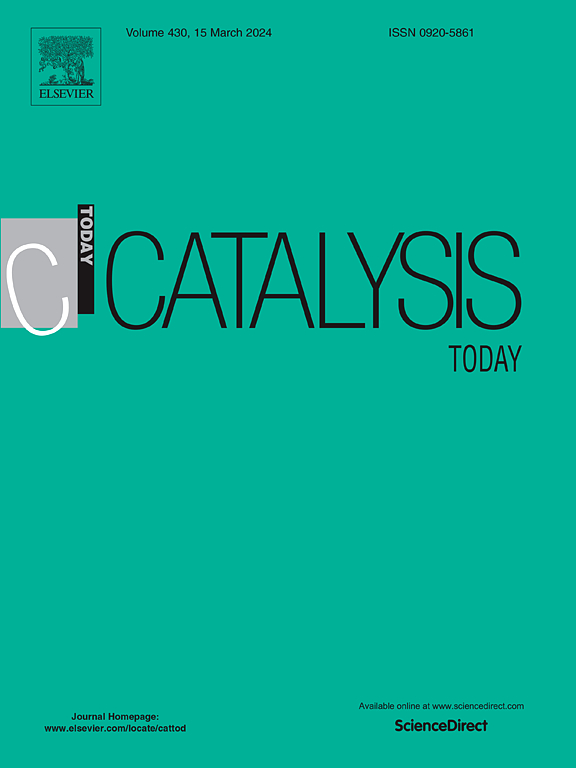使用异相 MoO3/MCM-41 催化剂从玉米油中生产生物柴油的表征和优化
IF 5.2
2区 化学
Q1 CHEMISTRY, APPLIED
引用次数: 0
摘要
世界各地已开发出不同类型的异相催化剂,并对以玉米油为原料通过酯交换反应和酯化反应生产生物柴油进行了测试。本研究采用孔饱和法将不同含量的 MoO3 加入介孔分子筛 MCM-41 中,形成异相催化剂(MoO3/MCM-41)。表征结果证实了 MCM-41 结构的形成和钼对介孔相的填充,以及不同的表面积、体积和孔径。硅醇基团赋予分子筛酸性,钼含量超过最佳值会降低催化剂表面酸性位点的可用性,填充微孔和介孔通道,导致酸性降低。催化性能评估采用了以三个中心点为单位的 22 因式设计,以优化包括氧化钼含量和温度在内的反应参数。在油醇摩尔比为 1:20 的条件下,催化剂载量为 3%(含 15 wt% 的 MoO3),温度为 150 °C,反应时间为 3 小时,最高产率为 87.87%。温度对生物柴油产量的影响最大。本文章由计算机程序翻译,如有差异,请以英文原文为准。
Characterization and optimization of biodiesel production from corn oil using heterogeneous MoO3/MCM-41 catalysts
Different types of heterogeneous catalysts have been developed worldwide and tested for biodiesel production from corn oil as a feedstock via the transesterification and esterification reactions. In this study, varying contents of MoO3 were incorporated into the mesoporous molecular sieve MCM-41 using the pore saturation method to form heterogeneous catalysts (MoO3/MCM-41). Characterization results confirmed the formation of the MCM-41 structure and the mesoporous phase filling by molybdenum, along with different surface areas, volume, and pore diameters. The silanol groups impart acidity to the molecular sieve, and a molybdenum content above the optimum reduced the availability of acidic sites on the catalyst surface, filling the micro and mesoporous channels, resulting in lower acidity. Catalytic performance was evaluated using a 22 factorial design with three center points to optimize reaction parameters including MoO3content and temperature. The maximum yield was 87.87 %, achieved with a 3 % catalyst load containing 15 wt% MoO3, at an oil-to-alcohol molar ratio of 1:20 at 150 °C for 3 h. Temperature had the most significant influence on biodiesel yield.
求助全文
通过发布文献求助,成功后即可免费获取论文全文。
去求助
来源期刊

Catalysis Today
化学-工程:化工
CiteScore
11.50
自引率
3.80%
发文量
573
审稿时长
2.9 months
期刊介绍:
Catalysis Today focuses on the rapid publication of original invited papers devoted to currently important topics in catalysis and related subjects. The journal only publishes special issues (Proposing a Catalysis Today Special Issue), each of which is supervised by Guest Editors who recruit individual papers and oversee the peer review process. Catalysis Today offers researchers in the field of catalysis in-depth overviews of topical issues.
Both fundamental and applied aspects of catalysis are covered. Subjects such as catalysis of immobilized organometallic and biocatalytic systems are welcome. Subjects related to catalysis such as experimental techniques, adsorption, process technology, synthesis, in situ characterization, computational, theoretical modeling, imaging and others are included if there is a clear relationship to catalysis.
 求助内容:
求助内容: 应助结果提醒方式:
应助结果提醒方式:


